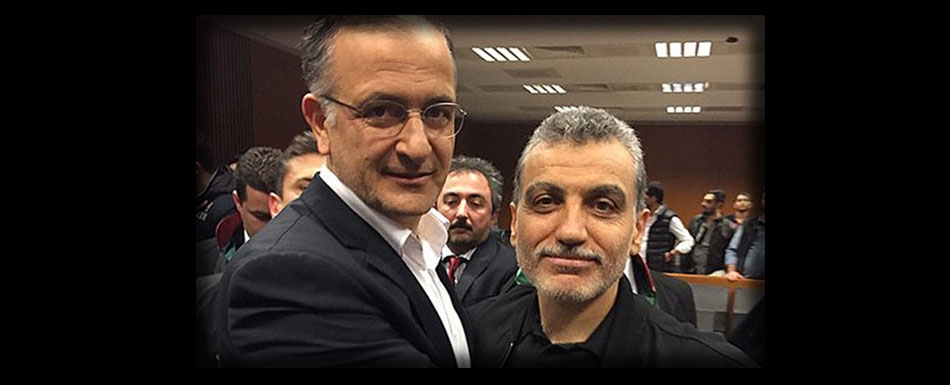Judge’s rulings in case against journalists full of contradictions

Rulings issued by Judge Bekir Altun, who oversaw a case against detained journalists and police chiefs at the İstanbul 1st Criminal Peace Court, have been found to be contradictory.
Firstly, the criminal case against the journalists, media professionals and former police chiefs who were detained on Dec. 14 was based on a complaint from a suspected member of a group known as Tahşiyeciler (Annotators) who claimed police had framed him. However, the criminal case against the armed group and its leader, Mehmet Doğan, who called for an armed fight against infidels, supported Osama bin Laden, asked for the killing of Turkey's political and religious leaders and sanctioned the decapitation of Americans, is still pending at the Bakırköy 3rd High Criminal Court.
In other words, Judge Altun interfered in the Bakırköy court's case by assuming that the Tahşiyeciler group was framed and the allegations listed in the complaint from an al-Qaeda-affiliated group member are true. If the terror trial against Tahşiyeciler is found to be legitimate and its members are convicted, Judge Altun will have committed a crime. He should have waited until the case is completed in the Bakırköy court before proceeding with arrest warrants against the journalists and police chiefs.
The rulings passed by Judge Altun, including the order to arrest one journalist and several police chiefs while letting others go free pending trial, contradict each other. While the Zaman daily's editor-in-chief was detained for five days before an arraignment hearing based on two columns and one news story his newspaper published in 2009, the journalist Hüseyin Gülerce, who wrote one of those columns, was never detained. Instead, a summons for a deposition was issued for him to come in and testify and he was let go after questioning.
It was somewhat bizarre for the judge to treat two op-ed pieces and a news article that were published five years ago as criminal evidence today. As Zaman Editor-in-Chief Dumanlı argued in his defense in court, these articles can only be subject to charges under press laws rather than counterterrorism laws. Yet not a single complaint or correction request was made by anybody personally or through the court since they were published in 2009 up until last week, when police detained journalists, media staff and former police chiefs.
It is also not clear how Judge Altun decided to let some suspects go while deciding to arrest others. The police officers who were accused of planting the bombs at a safe house used by Tahşiyeciler were released, while Tufan Ergüder, former deputy police chief at the İstanbul Police Department, was arrested. The only evidence in the case against Ergüder is his signature on a document that was forwarded by the National Intelligence Organization (MİT) to the police's counterterrorism department in İstanbul.
Ergüder was not involved in the operation against Tahşiyeciler on Jan. 22, 2010, when police raided the homes and offices of 112 people across Turkey and discovered three hand grenades, one smoke bomb, seven handguns, 18 hunting rifles, electronic parts for explosives, knives and a large cache of ammunition.
The arrest of Hidayet Karaca, the Samanyolu Broadcasting Group general manager, by the judge also does not make any sense. According to the charge, Karaca allegedly gave an order to the police when his network aired an episode in a popular TV series called "Tek Türkiye" (One Turkey) that featured fictional events. In the episode, the name “Tahşiyeciler” was mentioned, along with other terrorist groups.
While the producer, director and scriptwriters were all released by the prosecutor after questioning, Karaca was arrested by the judge based on a soap opera of which he was neither a scriptwriter nor a director. Karaca holds a high level position at the network, which has dozens of TV stations, radios and websites in Turkey and abroad. Karaca defended himself by saying that if a fictional scenario forms the basis for a criminal investigation, the whole TV and movie industry in Turkey will collapse.
What is more, the TV series that were aired between 2007 and 2011 were contracted to a film production company and were not shot by the network itself. This is the first time in Turkey that a top network manager was charged for establishing and running a terrorist organization based on a soap opera script.
Another contradiction in the case against Karaca was the judge's decision to refer to a conversation between Karaca and Islamic scholar Fethullah Gülen that was recorded illegally and without court approval. The audio recording, leaked on social media earlier this year, was a private conversation between Karaca and Gülen, featuring nothing criminal. Gülen's lawyers have already filed a criminal complaint with the prosecutor's office months ago, asking that those who wiretapped their clients be identified and punished for the violation of their clients' constitutional rights to privacy of communication.
The prosecutor did not ask any question to Karaca based on the wiretap after his lawyers interjected and said the audio was illegal and therefore cannot be a base for any judicial investigation. However, Judge Altun referred to the illegal wiretap when he issued his decision, even though the prosecutor did not raise that when he made his submissions in the case. This was interpreted by Karaca's lawyers as evidence that the decision to arrest their client was already made by political authorities in advance of the arraignment hearing.
- Created on .
